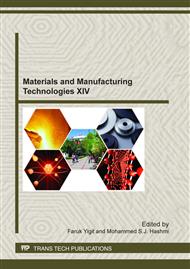[1]
H. Chtourou, W. Masmoudi and A. Maalej: an expert system for manufacturing systems machine selection. Expert Systems with Applications, Vol. 28 (2005), p.461.
DOI: 10.1016/j.eswa.2004.12.007
Google Scholar
[2]
U.M. Al-Turki, S. Arifusalam, M. El-Seliaman and M. Khan: Resource allocation and batch sizing in a flexible job shop. Advanced Materials Research, Vol. 264-265 (2011), p.1758.
DOI: 10.4028/www.scientific.net/amr.264-265.1758
Google Scholar
[3]
T.S.C. Felix, J. Bing and K.H.T., Nelson: the development of intelligent decision support tools to aid the design of flexible manufacturing systems. International Journal of Production Economics Vol. 65 (2000), p.73.
DOI: 10.1016/s0925-5273(99)00091-2
Google Scholar
[4]
C. Liu and S. Change: scheduling flexible flow shops with sequence dependent setup effects. IEEE Transactions on Robotics and Automation Vol. 16 (2000), p.408.
DOI: 10.1109/70.864235
Google Scholar
[5]
D. Cao, M. Chen and G. Wan: parallel machine selection and job scheduling to minimize machine cost and job tardiness. Computers and Operations Research Vol. 32 (2005), p. (1995).
DOI: 10.1016/j.cor.2004.01.001
Google Scholar
[6]
G. Kyparisis and C. Koulamas: flexible flow shop scheduling with uniform parallel machines. European Journal of Operational Research Vol. 168 (2006), p.985.
DOI: 10.1016/j.ejor.2004.05.017
Google Scholar
[7]
D. Quadt and H. Kuhn: batch scheduling of jobs with identical process times on flexible flow lines. International Journal of Production Economics, Vol. 105 (2007), p.385.
DOI: 10.1016/j.ijpe.2004.04.013
Google Scholar
[8]
I. Badr: an agent-based scheduling framework for flexible manufacturing systems. World Academy of Science, Engineering and Technology, Vol. 40 (2008), pp.363-369.
Google Scholar
[9]
J.C. Chen, K.H. Chen, J.J. Wu and C.W. Chen: a study of the flexible job shop scheduling problem with parallel machines and reentrant process. The International Journal of Advanced Manufacturing Technology Vol. 39 (2008), p.344.
DOI: 10.1007/s00170-007-1227-1
Google Scholar
[10]
A. Allahverdi: two-machine proportionate flow shop scheduling with breakdowns to minimize maximum lateness. Computers and Operations Research Vol. 23 (1996), p.909.
DOI: 10.1016/0305-0548(96)00012-3
Google Scholar
[11]
A. Allahverdi and M. Tatari: simulation of different rules in stochastic flowshops. Computers and Industrial Engineering Vol. 31 (1996), p.209.
DOI: 10.1016/0360-8352(96)00113-1
Google Scholar
[12]
Ali Allahverdi: stochastically minimizing total flow time in flow shops with no waiting space. European Journal of Operational Research Vol. 113 (1997), p.101.
DOI: 10.1016/s0377-2217(97)00438-4
Google Scholar
[13]
R. Ruiz, J. Diaz and C. Maroto: considering scheduling and preventive maintenance in the flowshop sequencing problem. Computers and Operations Research Vol. 34 (2007), p.3314.
DOI: 10.1016/j.cor.2005.12.007
Google Scholar
[14]
E. Aghezzaf, M. Jamali and D. Ait-Kadi: an integrated production and preventive maintenance planning model. European Journal of Operational Research, Vol. 181 (2007), p.679.
DOI: 10.1016/j.ejor.2006.06.032
Google Scholar
[15]
H. Allaoui, A. Artiba, G. Goncalves and E. Elmaghraby: scheduling n jobs and preventive maintenance in a single machine subject to breakdowns to minimize the expected total earliness and tardiness costs. Proceedings of the 17th World Congress, the International Federation of Automatic Control, Seoul, Korea (2008).
DOI: 10.3182/20080706-5-kr-1001.02678
Google Scholar
[16]
E. Moradi, S. Ghomi and M. Zandieh: bi-objective optimization research on integrated fixed time interval preventive maintenance and production for scheduling flexible job-shop problem. Expert Systems with Applications, (2011), in press.
DOI: 10.1016/j.eswa.2010.12.043
Google Scholar


